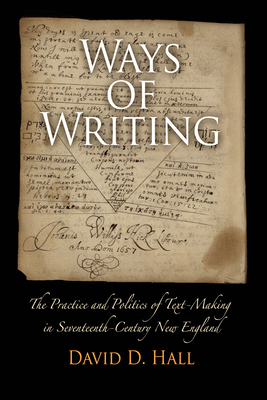

 University of Pennsylvania Press
University of Pennsylvania Press
Ways of Writing: The Practice and Politics of Text-Making in Seventeenth-Century New England


Key Metrics
- David D Hall
- University of Pennsylvania Press
- Paperback
- 9780812222081
- 8.9 X 6 X 0.9 inches
- 0.6 pounds
- Literary Criticism > American - General
- English
 Secure Transaction
Secure TransactionBook Description
Writers abounded in seventeenth-century New England. From the moment of colonization and constantly thereafter, hundreds of people set pen to paper in the course of their lives, some to write letters that others recopied, some to compose sermons as part of their life work as ministers, dozens to attempt verse, and many more to narrate a remarkable experience, provide written testimony to a civil court, participate in a controversy, or keep some sort of records--and of these everyday forms of writing there was no limit.
Every colonial writer knew of two different modes of publication, each with its distinctive benefits and limitations. One was to entrust a manuscript to a printer who would set type and impose it on sheets of paper that were bound up into a book. The other was to make handwritten copies or have others make copies, possibly unauthorized. Among the colonists, the terms publishing and book referred to both of these technologies. Ways of Writing is about the making of texts in the seventeenth century, whether they were fashioned into printed books or circulated in handwritten form. The latter mode of publishing was remarkably common, yet it is much less understood or acknowledged than transmission in print. Indeed, certain writers, including famous ones such as John Winthrop and William Bradford, employed scribal publication almost exclusively; the Antimonian controversy of 1636-38 was carried out by this means until manuscripts relating to the struggle began to be printed in England.
Examining printed texts as well as those that were handwritten, David D. Hall explores the practices associated with anonymity, dedications, prefaces, errata, and the like. He also surveys the meaning of authority and authenticity, demonstrating how so many texts were prepared by intermediaries, not by authors, thus contributing to the history of social or collaborative authorship. Finally, he considers the political contexts that affected the transmission and publication of many texts, revealing that a space for dissent and criticism was already present in the colonies by the 1640s, a space exploited mainly by scribally published texts.
Author Bio
David D. Hall has taught at HDS since 1989, and was Bartlett Professor of New England Church History until 2008, when he became Bartlett Research Professor. He writes extensively on religion and society in seventeenth-century New England and England.
His books include The Faithful Shepherd: A History of the New England Ministry in the Seventeenth Century; Worlds of Wonder, Days of Judgment: Popular Religious Belief in Early New England; Puritans in the New World: A Critical Anthology and, most recently, A Reforming People: Puritanism and the Transformation of Public Life in New England (2011). He has edited two key collections of documents: The Antinomian Controversy of 1636–1638: A Documentary History and Witch-Hunting in Seventeenth-Century New England: A Documentary History, 1638–1693.
Another interest is the "history of the book," especially the history of literacy and reading in early America. He edited, with Hugh Amory, The Colonial Book in the Atlantic World, the first of a five-volume series of which he was the general editor.
He continues to study and write about religion and culture in early America, with particular attention to "lived religion," and is presently writing a general history of Puritanism in England, Scotland, and New England c. 1550 to 1700, to be published by Princeton University Press.
- Education
- A.B., Harvard College, 1958 (History and Literature)
Ph.D., Yale University, 1964 (American Studies)
Source: Harvard Divinity School
Videos
No Videos
Community reviews
Write a ReviewNo Community reviews